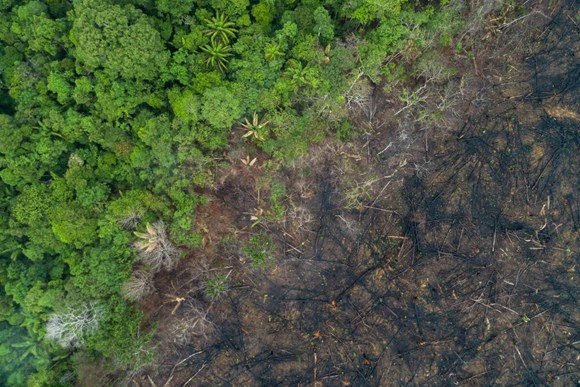Ahead of the Environment Bill returning to the House of Lords in early September, a new report from WWF has found that laws proposed by the UK Government to help eliminate deforestation in UK supply chains risk being ineffective, unless the scope of the legislation is widened.
Due Negligence examines plans in the Environment Bill to make it mandatory for large companies to carry out due diligence checks to ensure there is no illegal deforestation in their supply chains of forest-risk commodities and derived products.
The proposed measures will still allow products that result from legal deforestation, or devastating change to other natural ecosystems, to be sold in the UK.
The analysis highlights the complexity of assessing legal versus illegal deforestation: although satellite imaging can identify whether an area has been cleared, it cannot prove whether that action was legal or illegal.
On top of this, complex legal frameworks in producer countries and limited data transparency mean it is often difficult to determine whether a plantation that has been created at the expense of forest and other natural ecosystems has been done so legally.
This makes the proposed UK due diligence regulation extremely difficult for companies to comply with, and the UK government to enforce in practice.
Weakening legal protections
The report further suggests that one potential consequence of the legality model is that producer countries may weaken legal protections on forests and other natural ecosystems, putting more habitat under threat.
One of several controversial bills (PL 2633/20) currently going through the Brazilian Congress, which would give amnesty to land grabbers who have illegally invaded and deforested public lands, already shows this trend.
In Indonesia, the Omnibus Law passed in 2020 has paved the way for the legalisation of plantations located on land that was previously not designated for oil palm plantations.
The calls to strengthen due diligence measures in the UK’s flagship Environment Bill sit alongside WWF’s push for the government to adopt a legally binding target to slash the UK’s global environmental footprint by 2030.
‘Nature is our ally in the fight against climate change. To protect it, we must drastically reduce the UK’s global environmental footprint, not least by ensuring we aren’t adding to the destruction of precious habitats like the Amazon and Cerrado.
‘The law proposed by UK government to stop deforestation isn’t yet robust enough and must be strengthened if it is to prevent further destruction of natural ecosystems – whether legal or illegal.
‘This must sit alongside a legally binding target to slash the UK’s global environmental footprint by 2030. Ministers have promised to protect nature and ensure a safe climate for future generations – we won’t forget should they fail to deliver.’
KATIE WHITE
Executive director of advocacy and campaigns at WWF
 Play Video about This Rock Might Just Save The World
Play Video about This Rock Might Just Save The World Play Video about Play 2 hours of rock
Play Video about Play 2 hours of rock Play Video about Play 2 hours of brook
Play Video about Play 2 hours of brook Play Video about Play 2 hours of sheep
Play Video about Play 2 hours of sheep











































